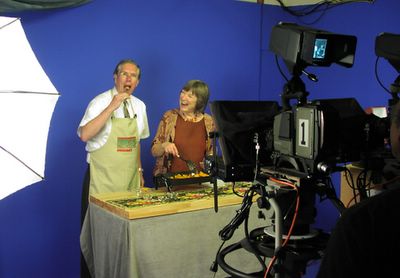Why the apocalypse will not be broadcast
Humboldt cut off from the outside world said the headline in the Eureka Times Standard. On Tuesday, we had our annual Christmas week storm and power outage. I'm not entirely kidding--all the serious outages I recall in the past ten years have been between Christmas and New Years, including the immense storms that caused a lot of flooding and destruction as 1996 became 1997--and literally did cut us off from the rest of the world for awhile (Rt. 101 was closed in both directions, as were portions of other roads, and planes weren't flying into or out of the airport.) Last New Years Eve there was another storm that left us without power for days.This time it was the day after Christmas, and a night and morning of wind and rain left us without electricity for several hours.
But that wasn't what the headline was about. Late in the day we lost all Internet connections and all long distance phone service. There was "a problem" somewhere north of here, but perhaps the most disturbing thing the paper said was that no one knew what it was or exactly where.I'm not sure exactly when Internet service was restored because in the interim we lost our electricity again. Winds raged through here all night and well into the morning--up to 50 mph. The power went down at abot 2:30 am and wasn't restored until Wednesday nightfall, just as we had the fireplace stoked up and were getting the candles in place.
The most maddening thing about this again this year was the lack of information about what was going on. When I lived in Pittsburgh, I could be confident that no matter how silly local radio and TV got--and they were getting increasingly silly---they would all have complete information in any emergency. Some stations would go to an all news format, while others would extend their regularly scheduled newscasts. Because they had regularly scheduled newscasts--on radio stations, at the top of every hour usually, or five minutes before. And probably news headlines at half-past.
But here on the North Coast we have no reliable source of news and information from any radio or television station. My guess is that there are three basic problems. First, conglomerates bought up local stations and ditched local news. With little or no local presence they are unable as well as unwilling to fulfill their public duty, which I would argue they are required to do by law since they are using our public airwaves.
Second, this is a small media market that has trouble getting and keeping experienced newspeople. It's easy to make fun of the teenagers who staff the news shows, with their fake media voices trying to make fluff and half-baked stories sound important. But in emergencies, when the public needs accurate information, it's not funny. The lack of it has a real potential to compound tragedy, if not cause some.
The third reason is that local media don't take the responsibility to inform the public seriously. Where are the regularly scheduled radio newscasts ? And if they can't afford to do them every day, how about scheduling news in times like this, on the hour and half-hour, so listeners will know when to tune in?
What did I hear today? A couple of guys grudgingly offering a few tidbits of info as part of their Studio 60/Daily Show repartee, in the midst of the discussion that really interested them: have any good bands ever come out of Ferndale? And a few mumbled sentences in the local break of All Things Considered, when we were told that power might or might not be off in some places, and if it was, it would be restored as soon as possible.
Isn't anyone being trained to make phone calls and insist on answers? Is it too much to ask to be able to get that information without listening for it amongst hours of music you may not really want to hear?
As beautiful and virtuous as it is, this is a vulnerable place. We are rather easily cut off from the world. We expect a major earthquake that can come at any time, probably accompanied by tsunami. Yet we have no system of obtaining information when we will most need it. There seem as well to be no clear lines of authority for those emergencies, which is something that ought to interest the local print media more than it seems to.
This week wasn't bad (although it's not over.) But the ease with which we lost power and Internet and long distance all at once should be sobering. It's not a joke anymore, if it ever was.
Six Months That Shake The Republic
-
It's coming up on six months since the reign of Chaos began. Six months!
Only three and a half years to go, if we even get there.
Things weren't go...
5 hours ago















